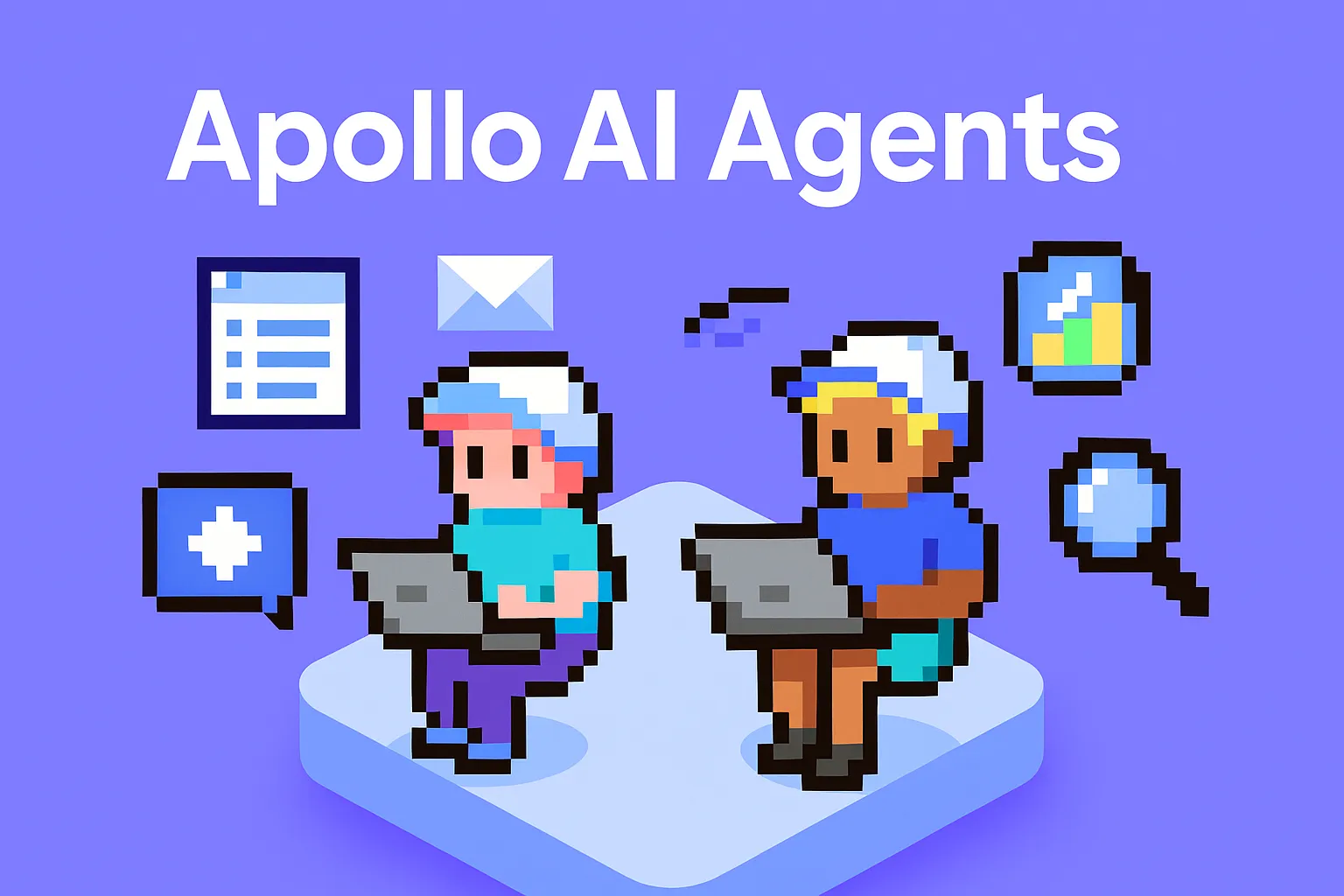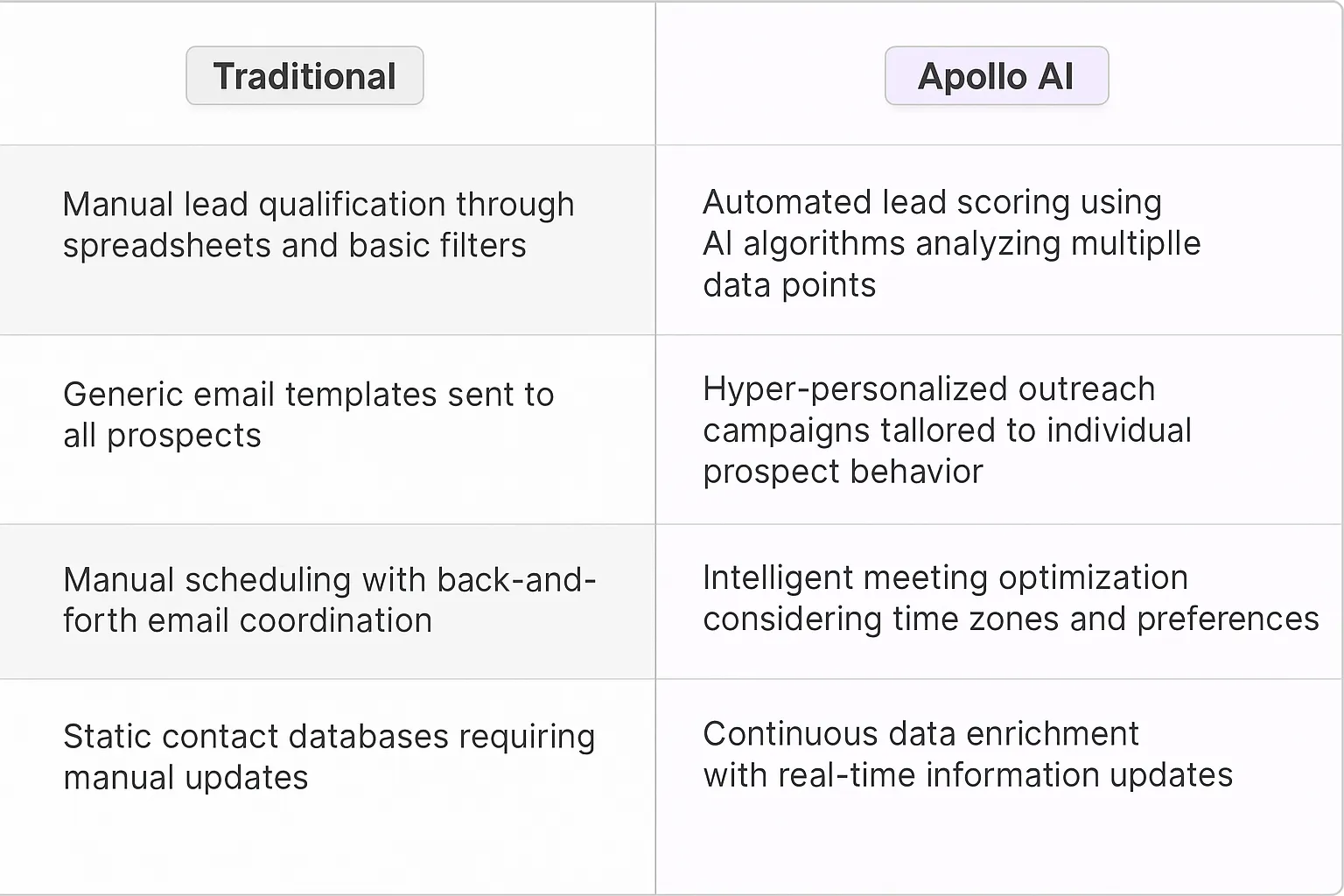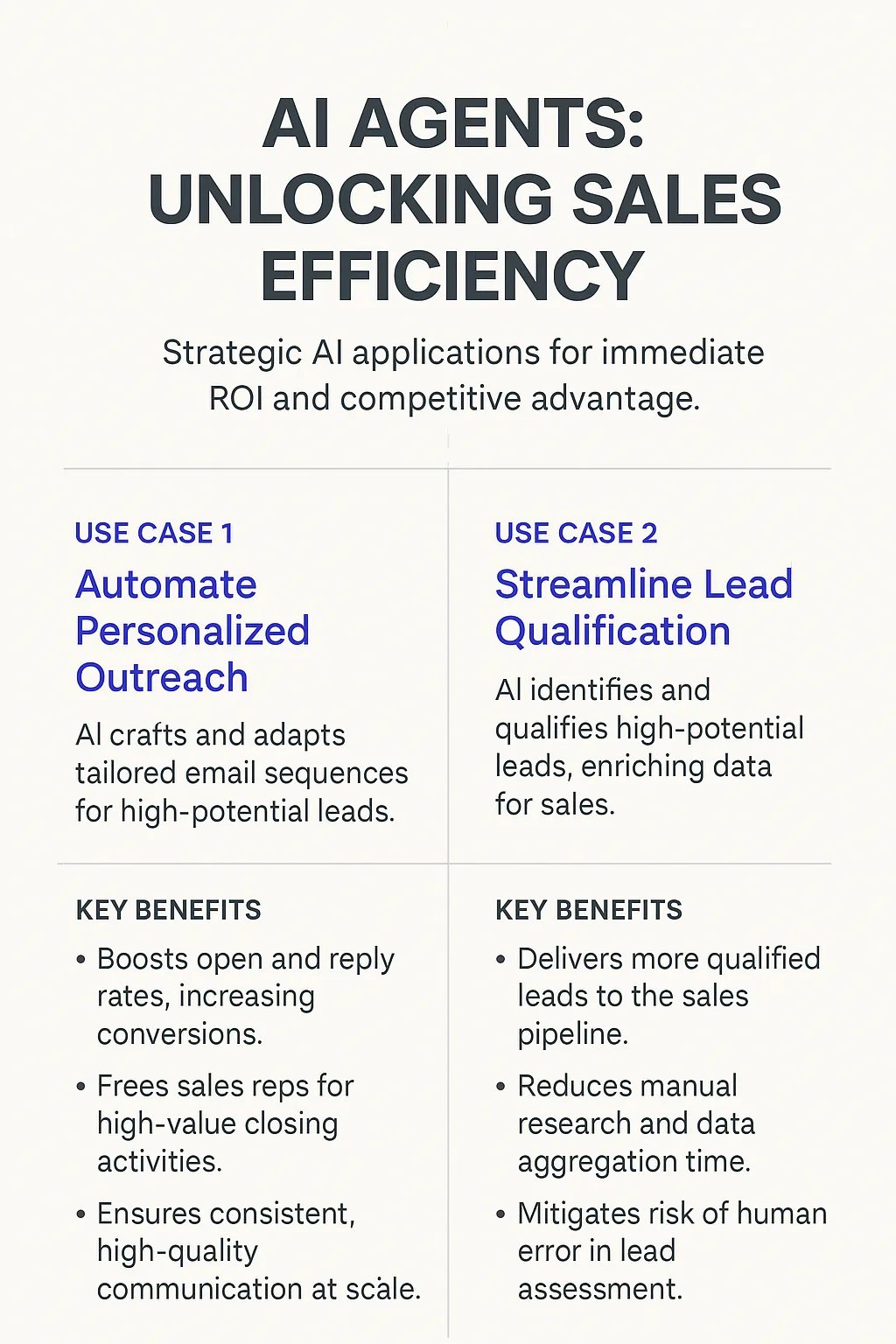Apollo AI Agents
Understanding Apollo
What is Apollo?
Apollo is a robust sales engagement platform that's taking the tech world by storm. It's not just another CRM or sales tool – it's a comprehensive ecosystem designed to supercharge sales teams' productivity and effectiveness. At its core, Apollo provides a suite of features for lead generation, email outreach, and sales analytics. But what sets it apart is its seamless integration of AI agents, turning it from a powerful tool into an indispensable ally for modern sales teams.
Key Features of Apollo
Apollo's feature set is impressive, but let's focus on the game-changers:1. AI-Powered Lead Scoring: Apollo's AI agents analyze vast amounts of data to identify and prioritize high-potential leads, saving reps countless hours of manual prospecting.2. Intelligent Email Sequencing: The platform's AI can craft personalized email campaigns that adapt based on recipient engagement, dramatically improving response rates.3. Real-Time Sales Intelligence: Apollo's AI agents continuously gather and analyze market data, providing reps with up-to-the-minute insights on prospects and competitors.4. Predictive Analytics: By crunching historical data, Apollo can forecast sales trends and help teams optimize their strategies for maximum impact.5. Natural Language Processing: Apollo's AI understands and responds to natural language queries, making it incredibly intuitive to use.

Benefits of AI Agents for Apollo
Let's dive into the world of Apollo and how AI agents are reshaping the landscape. As someone who's been in the trenches of tech for years, I've seen my fair share of innovations, but this one's got me genuinely excited.
What would have been used before AI Agents?
Before AI agents entered the scene, Apollo users were navigating a sea of manual processes. They'd be juggling multiple tools, spending hours on data entry, and playing detective to piece together insights from scattered information. It was like trying to build a rocket with a Swiss Army knife – possible, but painfully inefficient.
Teams would rely on a mix of project management software, communication tools, and good old-fashioned human memory to keep track of tasks, deadlines, and project details. The result? Information silos, missed opportunities, and a whole lot of frustration.
What are the benefits of AI Agents?
Now, with AI agents in Apollo, we're seeing a seismic shift in how teams operate. These digital teammates are like having a brilliant intern who never sleeps, never complains, and has perfect recall. Here's what's really cooking:
- Contextual Intelligence: AI agents in Apollo don't just store information; they understand it. They can connect dots across projects, spot patterns, and serve up relevant insights exactly when you need them. It's like having a team member who's read every document, attended every meeting, and remembers every detail.
- Predictive Project Management: These agents are getting scary good at anticipating bottlenecks and resource crunches before they happen. They're not just reacting to problems; they're helping teams stay ahead of the curve. It's proactive project management software on steroids.
- Natural Language Interaction: Forget clunky interfaces and complex query languages. Apollo's AI agents understand and respond to natural language. It's like texting your smartest colleague for instant answers, 24/7.
- Adaptive Learning: The more you use these AI agents, the smarter they get. They learn your team's rhythms, preferences, and quirks, becoming increasingly valuable over time. It's personalized productivity at scale.
- Cross-functional Collaboration: These agents break down silos by seamlessly sharing relevant information across teams. They're the ultimate connectors, ensuring everyone's on the same page without endless meetings or email chains.
What's really blowing my mind is how these AI agents are fundamentally changing the nature of work. They're not just tools; they're teammates that augment human creativity and decision-making. They're freeing up mental bandwidth for the kind of big-picture thinking and innovation that really moves the needle.
As we look ahead, I'm seeing AI agents in Apollo as a critical competitive advantage. Teams that leverage this technology effectively will outmaneuver, outthink, and outperform those stuck in old paradigms. It's not just about doing things faster; it's about unlocking entirely new possibilities in how we approach complex projects and challenges.
The bottom line? AI agents in Apollo are ushering in a new era of work – one where human ingenuity is amplified by artificial intelligence. It's a powerful combination that's set to redefine what's possible in project management and team collaboration. Buckle up, folks. This ride's just getting started.

Potential Use Cases of AI Agents with Apollo
Processes
Apollo, the sales engagement platform, is ripe for AI agent integration. These digital teammates could revolutionize how sales teams operate, turning Apollo from a powerful tool into an indispensable ally. Let's dive into some game-changing use cases:
1. Lead Qualification Automation: AI agents could sift through Apollo's vast database, applying complex algorithms to identify high-potential leads. They'd analyze factors like company size, industry trends, and recent news to prioritize outreach efforts.
2. Personalized Outreach Campaigns: By leveraging Apollo's data and integrating with other sources, AI agents could craft hyper-personalized email sequences. They'd tailor messaging based on the prospect's industry, role, and recent activities, significantly boosting response rates.
3. Meeting Scheduling Optimization: AI agents could manage the entire scheduling process, finding optimal times based on both parties' calendars, time zones, and preferences. They'd handle back-and-forth communications, reducing the administrative burden on sales reps.
Tasks
On a more granular level, AI agents could tackle specific tasks within Apollo:
1. Data Enrichment: AI agents could continuously update and enrich contact information, ensuring Apollo's database remains current and valuable. They'd cross-reference multiple sources, fill in missing details, and flag outdated information.
2. Email Response Analysis: These digital teammates could analyze prospect responses, categorizing them based on sentiment and intent. They'd provide sales reps with actionable insights, suggesting personalized follow-up strategies.
3. Competitive Intelligence Gathering: AI agents could monitor mentions of competitors within Apollo's ecosystem, compiling reports on market positioning and feature comparisons. This real-time intelligence would arm sales reps with valuable information during prospect conversations.
4. Performance Metrics Dashboard: By crunching numbers from various Apollo features, AI agents could generate comprehensive performance dashboards. They'd highlight trends, identify areas for improvement, and even suggest data-driven strategies to boost conversion rates.
5. Smart Call List Generation: Based on historical data and current market trends, AI agents could dynamically generate optimized call lists for sales reps. They'd consider factors like prospect engagement levels, time zones, and the rep's past success rates to maximize productivity.
The integration of AI agents into Apollo isn't just about automating tasks – it's about amplifying human potential. By offloading repetitive processes and providing data-driven insights, these digital teammates free up sales reps to focus on what they do best: building relationships and closing deals. As the AI capabilities evolve, we'll likely see even more innovative use cases emerge, further blurring the lines between human intuition and machine intelligence in the sales engagement platform process.

Industry Use Cases
Apollo AI agents are reshaping the landscape of numerous sectors, offering tailored solutions that address specific industry pain points. These digital teammates aren't just generic tools; they're specialized problem-solvers that can adapt to the unique challenges of different fields. Let's dive into some concrete examples that illustrate how Apollo AI agents are making waves across various industries, transforming traditional approaches and unlocking new possibilities.
From healthcare to finance, retail to manufacturing, these AI-powered allies are proving their worth by tackling complex tasks, enhancing decision-making processes, and driving innovation. They're not just automating mundane tasks; they're augmenting human capabilities in ways that were previously unimaginable. As we explore these use cases, you'll see how Apollo AI agents are becoming indispensable partners in the quest for efficiency, accuracy, and competitive edge in today's dynamic business environment.
Apollo AI Agents in Healthcare: Transforming Patient Care
Let's talk about how Apollo AI Agents could shake up the healthcare industry. These digital teammates aren't just another tech fad – they're poised to fundamentally alter how medical professionals operate and patients receive care.
Consider a bustling emergency room. Doctors and nurses are constantly juggling multiple cases, each requiring swift, accurate decisions. Enter an Apollo AI Agent, seamlessly integrated into the hospital's systems. This digital teammate doesn't replace human expertise; it amplifies it.
The Apollo Agent can instantly access and analyze a patient's complete medical history, current vitals, and relevant research papers. It's like having a hyper-intelligent medical resident that never sleeps and has perfect recall. When a doctor is assessing a patient with complex symptoms, the Apollo Agent can suggest potential diagnoses, flag any drug interactions, and even propose treatment plans based on the latest clinical trials.
But here's where it gets really interesting: Apollo Agents learn and adapt. They observe patterns in patient outcomes, treatment efficacy, and even subtle cues in patient behavior that humans might miss. Over time, these insights could lead to more personalized care strategies and earlier detection of health issues.
The potential ripple effects are massive. We could see reduced medical errors, shorter hospital stays, and more efficient resource allocation. For patients, this could mean faster, more accurate diagnoses and tailored treatment plans.
Of course, implementing AI in healthcare comes with its own set of challenges – data privacy, regulatory hurdles, and the need for seamless integration with existing systems. But the potential upside is too significant to ignore. Apollo AI Agents in healthcare aren't just about doing things faster; they're about fundamentally improving patient outcomes and pushing the boundaries of what's possible in medicine.
As we've seen in other industries, the early adopters who figure out how to effectively leverage these AI tools will likely gain a significant competitive advantage. It's not hard to imagine a future where hospitals and clinics are differentiated by the sophistication of their AI systems as much as by their human staff.
The healthcare industry is ripe for this kind of innovation. Apollo AI Agents could be the catalyst that propels us into a new era of medical care – one that's more precise, proactive, and patient-centric than ever before.
Apollo AI Agents in Finance: Redefining Investment Strategies
The finance world is about to get a serious upgrade. Apollo AI Agents are set to transform how we approach investments, risk management, and financial decision-making. This isn't just another fintech trend – it's a fundamental shift in how financial institutions operate.
Think about a hedge fund manager juggling multiple portfolios, each with its own complex set of variables. Now, introduce an Apollo AI Agent into the mix. This digital teammate doesn't just crunch numbers faster; it uncovers patterns and correlations that even the most seasoned analysts might miss.
The Apollo Agent can simultaneously analyze global market trends, company financials, social media sentiment, and geopolitical events. It's like having a team of savant-level analysts working 24/7, but with perfect recall and zero bias. When a fund manager is considering a new position, the Apollo Agent can provide a multi-dimensional risk assessment, suggest optimal entry points, and even predict potential market reactions.
But here's where it gets really interesting: Apollo Agents in finance don't just analyze – they learn and adapt. They observe successful trades, market reactions to various events, and even subtle shifts in investor behavior. Over time, these insights could lead to entirely new investment strategies and more accurate predictive models.
The implications are massive. We could see more stable markets, reduced systemic risks, and more efficient capital allocation. For investors, this could mean higher returns and better-tailored investment products.
Of course, integrating AI into finance isn't without challenges. There are regulatory hurdles, concerns about algorithmic bias, and the need to maintain human oversight. But the potential upside is too significant to ignore. Apollo AI Agents in finance aren't just about faster trades; they're about fundamentally improving how we understand and interact with financial markets.
As we've seen in other sectors, early adopters who effectively leverage these AI tools will likely gain a significant edge. It's not hard to envision a future where financial institutions are differentiated as much by their AI capabilities as by their human talent.
The finance industry is primed for this kind of disruption. Apollo AI Agents could be the catalyst that propels us into a new era of financial services – one that's more precise, proactive, and personalized than ever before. The question isn't if this transformation will happen, but who will lead it.
Considerations and Challenges in Apollo AI Agent Implementation
Implementing Apollo AI Agents isn't a walk in the park. It's more like navigating a complex maze while juggling flaming torches. Let's dive into the nitty-gritty of what you're up against.
Technical Challenges
First off, integrating Apollo AI Agents with existing systems is no small feat. You're essentially trying to teach a new digital teammate to play nice with your current tech stack. This requires a deep understanding of both Apollo's capabilities and your own infrastructure.
Data privacy and security are also major hurdles. Apollo AI Agents need access to vast amounts of data to function effectively, but this data often includes sensitive information. Striking the right balance between functionality and security is crucial.
Then there's the issue of scalability. As your organization grows, can your Apollo AI Agent keep up? Ensuring that the system can handle increased loads without compromising performance is a significant technical challenge.
Operational Challenges
On the operational side, employee adoption is a big one. Introducing a new AI agent into the workflow can be met with resistance. Some team members might view it as a threat to their jobs, while others might struggle to adapt to the new way of working.
Training and maintenance of the Apollo AI Agent is another ongoing challenge. Like any sophisticated system, it requires regular updates and fine-tuning to maintain peak performance. This means dedicating resources to keep the agent up-to-date and aligned with your evolving business needs.
Lastly, there's the challenge of managing expectations. Apollo AI Agents are powerful, but they're not magic. Setting realistic expectations about what the agent can and cannot do is crucial to avoid disappointment and ensure successful implementation.
Navigating these challenges requires a strategic approach, a willingness to adapt, and a clear vision of how Apollo AI Agents fit into your overall business strategy. It's a complex journey, but one that can yield significant rewards when done right.
Embracing the AI-Powered Future of Sales
Apollo's integration of AI agents marks a pivotal moment in the evolution of sales technology. We're not just talking about incremental improvements here – this is a fundamental shift in how sales teams operate. These AI agents are redefining the boundaries of what's possible in lead generation, prospect engagement, and deal closure.
But here's the kicker: we're still in the early innings of this AI revolution. As these digital teammates continue to learn and evolve, their impact will only grow. The sales teams that embrace this technology now, that learn to dance with these AI partners, will have a massive competitive advantage.
The future of sales isn't about AI replacing humans – it's about AI amplifying human capabilities. It's about freeing up sales reps to focus on what they do best: building relationships, understanding nuanced customer needs, and closing deals. Apollo, with its AI agents, is at the forefront of this transformation.
So, if you're in sales and you're not exploring how AI can supercharge your team, you're already falling behind. The Apollo platform isn't just a tool – it's a glimpse into the future of sales. And that future? It's AI-powered, data-driven, and incredibly exciting. Buckle up, because the sales game is about to change in ways we can barely imagine.













